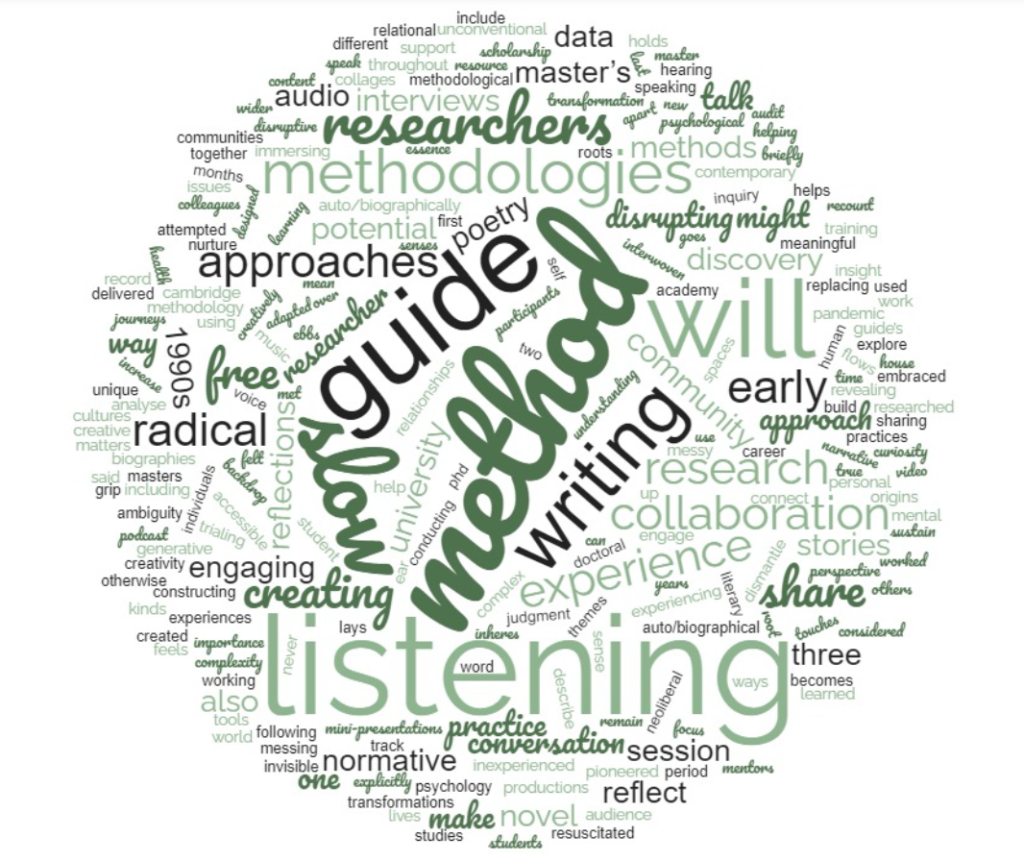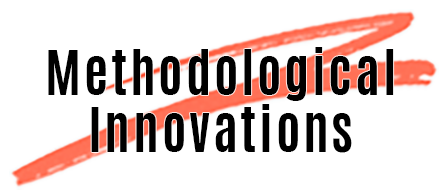Below are the abstracts provided by speakers at the conference. These summarise what each paper covered at our ‘Disrupting Normative Methodologies: Knowledge Production through Creativity and Collaboration’ conference (2023).
Word Cloud
This World Cloud was generated from the speakers’ abstracts.

‘Disrupting Stories’ – the ethics and purpose of research
Julie Parsons (University of Plymouth, UK)
Over the last decade the primary focus of my research has been on how to represent the lived experience of the criminal justice system as it is experienced by those caught up in it. This is through a well-established research partnership with LandWorks CIO (LWC), a resettlement charity that provides a route back into the community and employment for people in prison or at risk of going to prison. Since the charity started in 2013, I have been measuring its impact in three ways: (1) through a formal evaluation process; (2) the development of the Photographicelectronic Narrative (PeN) project in 2016; and (3) the Finishing Time (FT) project, started in 2018. These projects work with people who are on placement or who have graduated from LWC, providing a rare and valuable insight into the lived experience of resettlement into the community after punishment, both of which are ongoing and feed into the evaluation. Find out more about this here. In 2021 with Plymouth based social enterprise Fotonow CIC, a documentary film was made with three people who had participated in PeN and FT, highlighting some of the issues of importance to them.
In this paper I draw on examples of methodological approaches and techniques, including photo-voice, photo-elicitation, map making, walking interviews, i-poems, audio-visual montages, blogposts, focus groups and life-history interviews. The latest publication to include the research is a book called Acceptance, which weaves some of the dialogue from the PeN project interviews alongside a selection of blogposts published over the last ten years by the LandWorks project director. The book is a conscious raising endeavour, with a political message, it draws attention to the ethics of research, its purpose and its benefits.
Messing it up…Disrupting Normative Approaches by Trialing Novel Methods
Juliet Hall, Cheralyn May and Harriet Marks (University of Plymouth, UK)
Engaging with novel methodologies helps us as researchers to explore complex contemporary issues and increase understanding of the human experience. These approaches explicitly connect the researcher (the self) and the researched through the interwoven biographies of individuals. The researcher becomes a ‘resource for helping to make sense of the lives of others’ (Letherby, 2003, p. 96) sharing ‘what might otherwise remain invisible’ (Mauthner & Doucet, 1998, p. 141). Collaboration and creativity help us to engage with the true essence of the voice; revealing the complexity and ambiguity of personal stories to make them accessible to a wider audience.
As early career researchers, we have all embraced new approaches to research throughout our research journeys. These include poetry, audio reflections, video content and podcast productions; auto/biographical interviews, writing and collages. We share how it feels to use methodologies that might be considered unconventional and messy. Delivered as three mini-presentations, Harriet will share her experiences with writing poetry, creating audio reflections, writing auto/biographically, free writing and free speaking; Cheralyn will recount her experience conducting interviews about mental health during the pandemic from her perspective as an inexperienced masters student; and Juliet will describe how she felt participants stories were resuscitated by immersing herself in them and engaging creatively with the data.
Squeezing a space for working class narratives throughout the pandemic. Doing it yourself :The Working Class Lockdown Diaries UK
Lisa McKenzie (The Working Class Collaborative, UK)
In the first weeks of a growing global health crisis, like millions of people around the UK, ethnographer and working class scholar Lisa Mckenzie found herself sitting at home alone, watching news reports on the spread of COVID-19. Knowing from long experience that accounts of the pandemic would be certain to be shaped and filtered by those with power and platforms, Lisa was determined to ensure that working class people’s stories, voices and experiences would not go unheard.
When she put out a call for working class people in the UK to share their accounts of their daily lives during the early days of the pandemic, responses came from all over. More than 40 people sent their diaries to Lisa. Some accounts were traditional diary entries sent by email; others came via social media status updates, text messages, or written longhand and posted; yet others were sets of images. Fearing that the emotion and truth of these accounts of working class lives during the pandemic would all too likely be lost in the editing and publishing process of academic research, Lisa decided to do it herself instead. With thousands of people backing the book project through crowdfunding, and with the help of a cooperative of storytellers, artists and allies, Lockdown Diaries of the Working Class was born out of solidarity, and the conviction that working class people need to be in charge of telling their own stories.
Disrupting normative methodologies: Slow method, collaboration, and
community.
Natasha Mauthner (Newcastle University, UK) and Andrea Doucet (Brock
University, Canada)
Against the backdrop of neoliberal transformations of the academy and audit cultures, and what these mean for researchers, including PhD students, we reflect on slow scholarship as a practice for creating disruptive spaces and methodologies. Our talk touches on three themes: (1) our approach to ‘slow method’: here we share how we learned the Listening Guide, a feminist relational narrative method pioneered by Carol Gilligan and her colleagues at Harvard University in the early 1990s, and which we have used and adapted over the last 30 years; (2) the ebbs and flows of our ‘slow collaboration’, writing together and apart about the Listening Guide and methodological matters over this same time period; and (3) the importance of creating ‘slow communities’ which can nurture, support and sustain these kinds of practices, relationships, and meaningful work. One such community is one that Carol Gilligan created at Cambridge University, when we first met and worked with her in the early 1990s for 17 months, learning the Listening Guide and using it to analyse our doctoral data. We also reflect on how we have both attempted to build on this unique and generative experience as slow method researchers and mentors.
Radical Listening: a creative approach to methods and methodology.
Professor Carol Gilligan (New York University, USA)
Following Audre Lorde’s insight that “the master’s tools will never dismantle the master’s house,” the listening guide method or way of working was designed to free research from the grip of the master. The Guide lays out a practice of listening that is radical in two senses of the word: it goes to the root of what is being said (and not said)—the conversation under the conversation—and. by replacing judgment with curiosity, holds a potential for transformation. In this session, I will talk briefly about the origins of the method, its roots in psychology, literary studies, and music, about the listening guide as a method of ear training and a way of hearing different ways of experiencing and constructing the world. I will also speak of the Listening Guide’s track record as a method of discovery and of the radical potential that inheres in psychological inquiry.
To access other content from the event, click on the buttons below:
